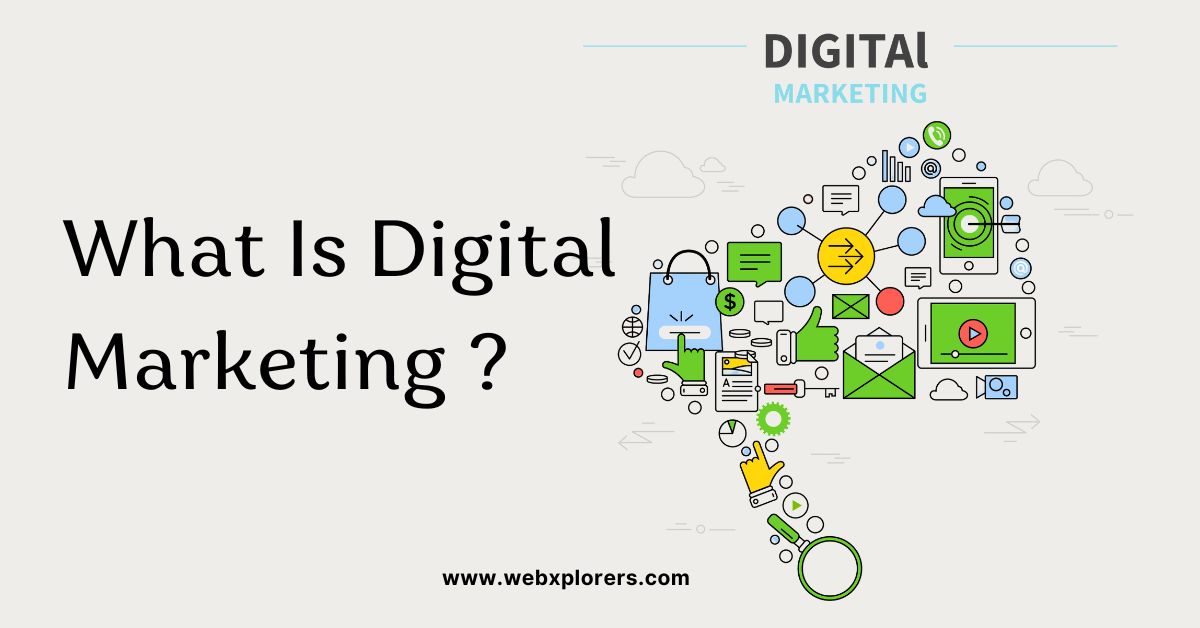In today’s fast-paced digital era, businesses must adapt to the ever-evolving online landscape to stay competitive. Digital marketing refers to the promotion of products or services using digital channels like search engines, social media, email, and websites. This modern marketing approach allows businesses to engage with a global audience and achieve measurable results.
Digital marketing is not just a trend—it’s an essential tool for businesses aiming to succeed in a digital-first world. From startups to established brands, companies use digital marketing to enhance their visibility, boost sales, and connect with their target audience effectively.
What is Digital Marketing?
Digital marketing refers to the use of digital channels like websites, social media, search engines, email, and mobile apps to promote products or services. Unlike traditional marketing, which relies on offline channels like print media and TV, digital marketing allows businesses to engage with their audience in real time.
For example, a company running Facebook ads can track engagement and tweak campaigns instantly. Digital marketing is cost-effective, measurable, and highly targeted, making it a critical tool for businesses of all sizes.
Types of Digital Marketing
01.Search Engine Optimization (SEO):
SEO is the process of optimizing your website to rank higher on search engine results pages (SERPs). It helps improve visibility and organic traffic.
- Importance: A well-optimized site attracts users who are already searching for your products or services.
- Examples: Blogging with targeted keywords, improving website speed, and earning backlinks are common SEO tactics.
02.Pay-Per-Click Advertising (PPC):
PPC involves paying a fee each time your ad is clicked. It’s a quick way to gain visibility on search engines or social media platforms.
- Example: Google Ads allows businesses to bid on keywords to appear at the top of search results.
- Benefits: Drives immediate traffic, especially for new businesses or product launches.
03.Content Marketing
Content marketing focuses on creating valuable and relevant content to attract and engage a target audience.
- Examples: Blogs, infographics, videos, and case studies.
- Why It Works: High-quality content establishes your brand as an authority and nurtures customer relationships.
04.Social Media Marketing (SMM)
Social media marketing involves using platforms like Facebook, Instagram, LinkedIn, and Twitter to connect with audiences.
- Overview: It’s an essential tool for engagement, brand awareness, and lead generation.
- Role of Engagement: Consistent interactions like comments and shares enhance brand visibility.
05.Email Marketing
Email marketing involves sending personalized messages to your audience to drive conversions.
- Examples: Newsletters, promotional emails, and drip campaigns.
- Why It’s Effective: Email marketing fosters direct communication, making it easier to build loyalty and trust.
06.Affiliate Marketing
Affiliate marketing is a performance-based strategy where businesses reward affiliates for driving traffic or sales.
- How It Works: Affiliates promote your products through unique links and earn a commission for successful referrals.
- Examples: Influencers or bloggers using affiliate links to promote products.
07.Influencer Marketing
Influencer marketing leverages the audience of influential individuals to promote products or services.
- Why It’s Trending: Consumers trust recommendations from influencers more than traditional ads.
- Examples: Instagram collaborations and sponsored content.
Components of Digital Marketing
Digital marketing is built on several critical components:
- Content: Quality content is the backbone of digital marketing. It informs, entertains, or solves problems for your audience.
- Keywords: These drive SEO and PPC campaigns by helping your content rank on search engines.
- Analytics: Tools like Google Analytics help track performance and refine strategies.
- Target Audience: Understanding your audience is key to creating campaigns that resonate.
- Platforms: Leveraging the right channels (e.g., Google, Facebook) ensures maximum ROI.
Key Benefits of Digital Marketing
- Cost-Effective: Compared to traditional marketing, digital marketing offers a more affordable way to promote products, especially for small businesses.
- Measurable Results: Analytics tools provide insights into campaign performance, helping you optimize for better results.
- Broader Reach: Digital marketing enables businesses to reach a global audience, breaking geographical barriers.
- Personalization: Through tools like email automation, brands can deliver tailored messages to different customer segments.
- Flexibility: Digital marketing campaigns can be adjusted in real time to adapt to audience preferences or market changes.
- Brand Visibility: With proper SEO and social media strategies, businesses can boost their visibility and establish authority in their industry.
Why Digital Marketing Matters Today
In today’s fast-paced digital world, consumer behavior has shifted significantly toward online platforms.
- Increased Mobile Usage: More than half of internet users access it through mobile devices, making digital marketing a necessity.
- Social Media Influence: Platforms like Instagram and TikTok shape purchasing decisions for millions of users.
- Example: Brands like Nike have successfully leveraged digital marketing to maintain global recognition.
Future of Digital Marketing
The future of digital marketing is exciting, with emerging trends set to redefine the industry:
- Artificial Intelligence (AI): Personalized content recommendations and chatbots are becoming more common.
- Automation: Tools like HubSpot simplify repetitive tasks, saving time and improving efficiency.
- Data-Driven Decisions: Businesses are using analytics to predict consumer behavior.
- Video Marketing: Platforms like YouTube and TikTok are dominating marketing strategies.
- Interactive Content: Quizzes, polls, and AR experiences are engaging users like never before.
Conclusion
Digital marketing has revolutionized the way businesses connect with customers. From SEO to influencer marketing, it offers endless possibilities to grow and succeed in the digital age. By leveraging its components and benefits, businesses can create impactful campaigns that drive results.
Whether you’re a beginner or an experienced marketer, digital marketing provides tools and opportunities to thrive in today’s competitive landscape. Start your journey today and unlock your brand’s full potential!

